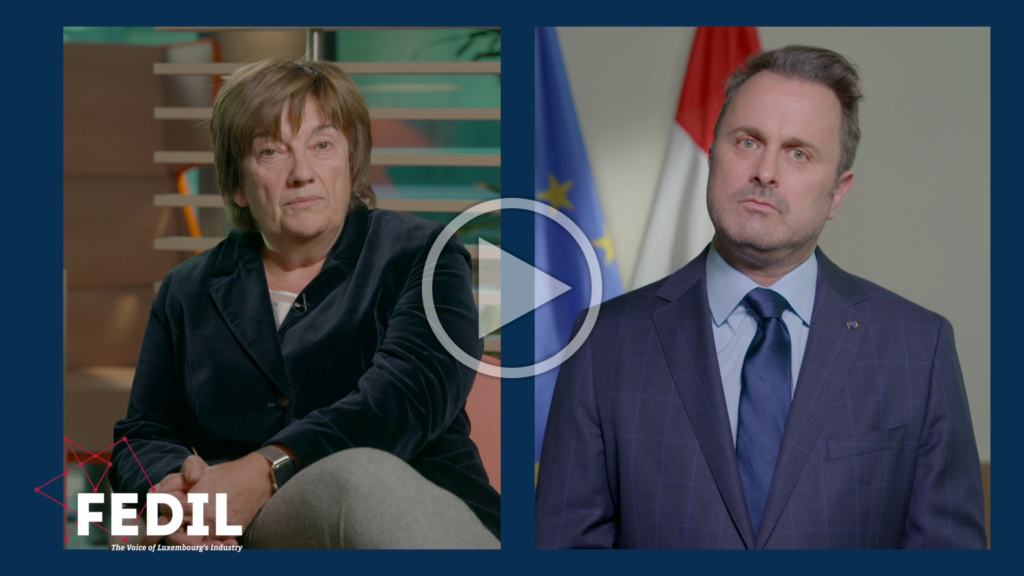Michèle Detaille’s New Year’s speech 2022
Prime Minister, dear FEDIL members, Ladies and Gentlemen,
This is the second time in a row that we have not held our New Year’s reception.
We have cancelled this event that is so dear to us and to you as a precaution.
This is the same precautionary principle that we apply in our companies to combat covid.
Be assured, this is only a postponement. Our teams are already working hard to organise a major economic event in spring, one that will make history and where we will be able to gather again without running the risk of contamination, as is the case now.
The New Year’s reception is traditionally an opportunity to welcome our Prime Minister to deliver a political message to our business community. I would like to thank him for accepting our invitation to record a message.
Ladies and Gentlemen,
2021 has been marked by a new wave of restrictions. These restrictions have handicapped our economy, requiring the continuation or adaptation of government support programmes for companies and employees.
But 2021 is also the year of the massive deployment of vaccines. These vaccines have enabled a large majority of our fellow citizens to reduce the danger of their exposure to the virus. It is now a question of building on vaccination to move forward on the long road out of the health crisis.
I think the government has handled this difficult situation well. You have been concerned to find the right balance between controlling the health situation on the one hand and preserving freedoms on the other. We also appreciate that, in general, political decisions that affect businesses were prepared in dialogue with the federations and professional chambers, even if, as you know, the final results did not always correspond 100% to our expectations and those of our members.
From an economic perspective, 2021 clearly showed signs of recovery. Recovery because the anti-COVID measures were no longer as restrictive as in 2020, recovery because consumers started spending again and recovery because government policies stimulated investment.
Unfortunately, this demand has met with an often deficient offer due to a production weakened by several phenomena:
- Disruptions in supply chains,
- soaring commodity and energy prices,
- shortage of skilled labour and unusual absenteeism rates.
The return of inflation is here!
A growing number of experts and analysts predict that it is unlikely to disappear any time soon. This is also our conviction. Our companies have been suffering from high costs daily for several months.
The government must make inflation a concern in its economic and social policies to preserve the competitiveness of our companies.
We understand that the main reasons for recent inflationary trends and the resulting social consequences are largely beyond political control. Nevertheless, a number of preventive or corrective actions can be taken or prepared by our governments.
This is mainly to ensure that trade runs smoothly with our trading partners, especially within the European single market.
Do you want examples?
The recent criticism by the European Commission of the Grand Duchy’s restrictive transposition of the Posting of Workers Directive in its application is a striking example of an unhealthy attitude that undermines the European market.
The same applies to initiatives to introduce national due diligence in supply chains. For such a complex issue, which is so crucial for the integrity of the internal market, the European route must be favoured. It would be all the more deplorable if Luxembourg were to go it alone, as the European Commission is working intensively on a proposal for common legislation.
Another example is energy policy.
We know that the Grand Duchy’s positions and actions are not decisive in ensuring a secure and competitive supply of energy in Europe. Nevertheless, we believe that, given the social stakes and the needs of its industry, our country has an interest in making a constructive contribution to this effort.
For it is not enough to set increasingly ambitious targets by imposing more restrictions, it is also necessary to facilitate the search for and implementation of viable solutions that reconcile economic, ecological and social aspirations.
Let’s take a look at the climate policy. Last year, the government adopted the sectoral climate trajectories up to 2030. This leaves us eight years to halve industrial emissions. FEDIL has repeatedly stated that it shares the climate targets in general and the sectoral targets in particular. But we have also stressed that the success of climate policy will depend on the framework that is created to avoid large gaps between ambitions and their feasibility. The wider these gaps become, the more undesirable economic and social consequences will emerge. The current spike in energy and CO2 prices gives a foretaste of what can be expected when innovation, investment and government ambitions no longer keep pace.
I would be remiss if I did not mention the problem of the availability of labour. Our companies regularly report to us that the shortage of skilled labour is a limiting factor in their activity. We all know that the issue of qualification cannot be reduced to the education system alone. Continuing education plays an increasingly important role in a constantly changing professional world. I would like to take this opportunity to encourage all our members to anticipate these changes. Dear colleagues, we need to make the necessary continuing education efforts for our staff. We can do this internally or in specialised training centres in Luxembourg or in the Greater Region.
To maintain the attractiveness of the country for qualified personnel, specific tax incentives are needed. Shortened authorisation procedures for non-EU workers would also help to bridge local shortages.
The legislature began with a politically decided overall reduction in working time in the form of extra leave and an additional public holiday. Then the pandemic caused absenteeism to skyrocket in the form of sickness, isolation, quarantine and family leave. Some companies report that the recent introduction of 3G in the workplace is also a source of absenteeism. We are not questioning the wisdom of health measures that may temporarily disrupt our organisations, but we are asking for support and solidarity from policy makers and public authorities. We also need more corrective measures to redress the situation.
The pandemic has boosted the digitalisation of our companies. During the period of the lockdown and forced teleworking, some administrations were inaccessible, and some administrative procedures were even interrupted. This situation revealed a gap in e-government. The 2023 electoral deadline will be a good time to take stock of the progress of digitalisation in the State services.
The question of the degree of implementation and use of the new solutions by citizens and businesses will have to be addressed. We encourage the government to keep up the momentum. We encourage it to use the year and a half remaining before the elections to get as close as possible to the ambitious targets set out in the government’s 2018 programme.
The pandemic has also fostered new forms of work.
In this respect, we agree with the political attitude and the position of the social partners that a specific model cannot be imposed or favoured. The organisation of work must be decided within the company, according to the needs and constraints of each party and of course, taking into account the importance of performance and productivity improvements that companies and administrations are aiming for or should be aiming for permanently.
Ladies and Gentlemen,
In 2022, political parties will start drafting their electoral programmes for 2023.
Based on the observation that political action impacting companies is too often motivated by an unjustified mistrust of them, FEDIL wants to place its dialogue with the parties under the sign of restoring trust. We will come back to this in the course of the year.
It remains for me to wish you a happy new year: may it keep you, your families and your businesses healthy.


